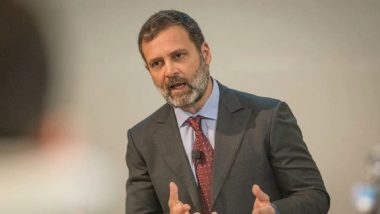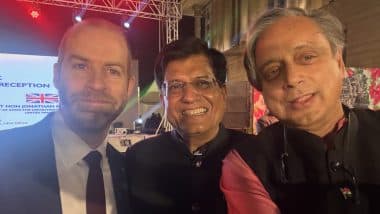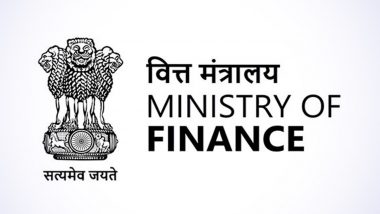London, March 1: Former Congress president Rahul Gandhi focused his lecture at the prestigious University of Cambridge on the "art of listening" and called for a new thinking to promote a democratic environment globally, as opposed to a coercive one.
Referencing to a decline in manufacturing in democratic countries such as India and the US in recent years as production shifted to China, Gandhi said the shift had produced mass inequality and anger which needed urgent attention and dialogue. Rahul Gandhi Arrives in UK To Address Cambridge University on ‘Learning To Listen in the 21st Century’.
The Opposition MP, who is a Visiting Fellow of the Cambridge Judge Business School (Cambridge JBS), delivered the lecture to students at the university on the subject of ‘Learning to Listen in the 21st Century' on Tuesday evening. "We simply cannot afford a planet that doesn't produce under democratic systems,” 52-year-old Gandhi said. Rahul Gandhi New Look: Congress Leader Looks Dapper After Finally Trimming Beard, Netizens Say 'Looking Smart' (See Pics).
"So, we need new thinking about how you produce in a democratic environment compared to a coercive environment… negotiation about this," he said.
Cambridge JBS said Gandhi's lecture to the MBA students revolved around the importance of people around the world finding a way of listening compassionately to new concerns in the 21st century, which has been transformed by the shift of production away from democratic countries. The "art of listening", when done consistently and diligently, is "very powerful," he said.
The lecture was divided into three key strands, starting with an outline of the Bharat Jodo Yatra – about 4,000-km walk Gandhi led through 12 states from September 2022 to January 2023 to draw attention to “prejudice, unemployment and growing inequality in India”.
The second strand of the lecture focussed on the “two divergent perspectives” of the US and China since World War II, especially since the 1991 collapse of the Soviet Union. Gandhi said that in addition to shedding manufacturing jobs, the US had become less open after the September 11, 2001, terror attacks. Meanwhile China, he said, “idolises harmony” through organisation around the Chinese Communist Party.
The final aspect of his lecture was around the theme of “Imperative for a Global Conversation”, as he knitted the different strands together in a call for a new type of receptiveness to various viewpoints.
He also explained to the Cambridge University student gathering that a "yatra" is a journey or pilgrimage in which people "shut themselves down so they can listen to others".
Gandhi was introduced to the Cambridge MBA student audience by Kamal Munir, Pro-Vice-Chancellor at the University of Cambridge and Professor of Strategy & Policy at Cambridge Judge Business School, as a member of a "long lineage of global leaders".
Gandhi's great-grandfather Jawaharlal Nehru, the first Prime Minister of India, was also a University of Cambridge alumnus, with the Cambridge Judge Chair in Indian Business and Enterprise is named after him. His father, former prime minister Rajiv Gandhi, was also a Cambridge alumnus, as is Rahul Gandhi himself.
Cambridge JBS said its MBA programme is for globally minded, successful individuals who want to understand the complexities of business and society and expressed gratitude to Gandhi for sharing his “experience and insight on global economics and policymaking”.
Gandhi is on a week-long tour of the UK and is scheduled to hold some closed-door sessions on Big Data and Democracy and India-China relations at Cambridge University. Later in the week, he will interact with representatives of the Indian Overseas Congress (IOC) UK chapter and also address an "Indian Diaspora Conference" planned over the weekend in London.
(This is an unedited and auto-generated story from Syndicated News feed, LatestLY Staff may not have modified or edited the content body)













 Quickly
Quickly





















